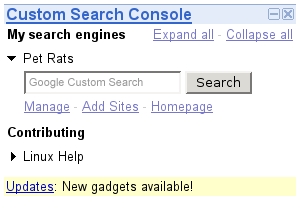It has always been our goal to enable anyone, anywhere create a Custom Search Engine. We're pleased to announce that we're getting closer to that goal. As of today, you can now create a Custom Search Engine for most languages and if you choose, you can give preference to results from a certain country as well. Here's how it works: For the time being, you have to go to http://google.com/coop/cse/ to create your search engine (in the future, we will have versions of CSE for each country). On the main CSE site, you will now however, have the option to specify the language for your Custom Search. The language you choose will set the language for the text on the search results page and give preference to results in that language. You can also choose 'All Languages' in which case the language associated with the user's browser will be used. If you want to give preference to search results from a particular domain, you can do so as pattern later on. If, for instance, you wanted your search results to only be from Japan, you would include *.jp as a pattern. (Please note the * is essential.) You can also choose to give preference to results from a certain country by changing your code to use the country specific google domain (e.g., such as google.ru or google.es as opposed to google.com). Please see http://google.com/coop/docs/cse/hosting.html for the details.
Caveats: If your search box is on a web page where the character encoding is not utf-8, you will need to specify the correct input encoding from the standard list. Support is in only for left-to-right languages, right-to-left languages such as Hebrew or Arabic are not supported at this time

